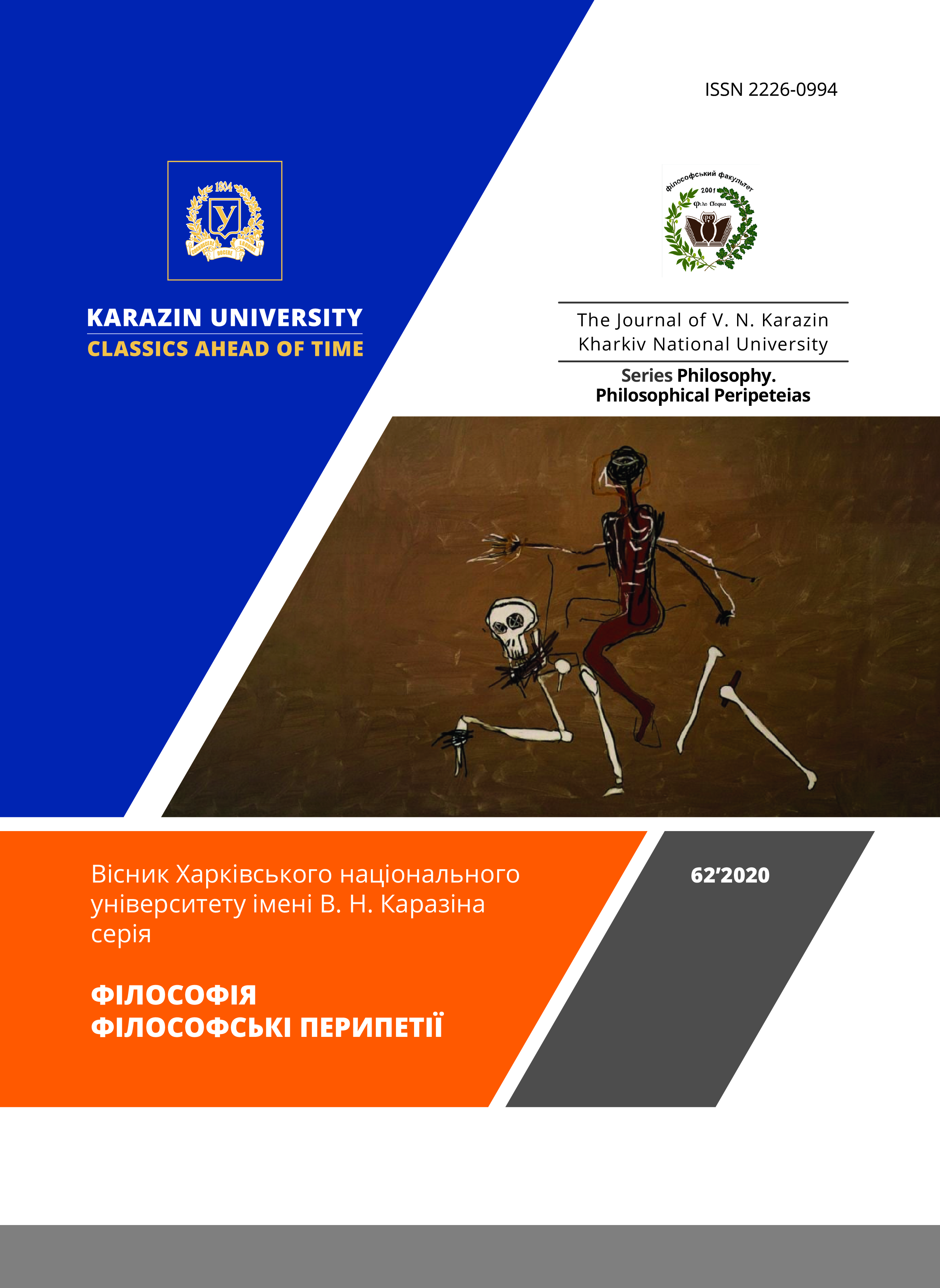КОНЦЕПЦІЯ ГНОСТИЦИЗМУ В ПОЛІТИЧНІЙ ФІЛОСОФІЇ Е. ФЕГЕЛІНА
Анотація
У статті розглядається концепція політичного гностицизму, розроблена австро-американським філософом Еріком Фегеліном. Ця концепція є одним з головних елементів фегелінівської політичної філософії, в якій він дає відповідь на питання про сутність сучасної політики. Фегелін вважає, що сучасність є результатом історичної перемоги ідеології «гностицизму». Історичне коріння гностицизму, вважає Фегелін, слід шукати не в добі пізньої античності, а в епоху середньовіччя. На основі ідей християнських містиків, таких як Йоахім Флорський, сформувалася ідеологія гностицизму, яка поширилась в західному світі і стала потужною політичною силою. Ця сила зробила «велику гностичну революцію» і загалом сформувала сучасне суспільство. Прикладами сучасних гностичних режимів є прогресизм, позитивізм, марксизм, психоаналіз, комунізм, фашизм, націонал-соціалізм. Сучасна політична наука нездатна дати критичне осмислення гностицизму, оскільки сама є продуктом гностичної ідеології. Тому сучасна політологія потребує відновлення своїх основоположних принципів, які були встановлені античними філософами, засновниками філософії політики. Фегелін називає це ретеоретізаціею політичної науки. Автор статті аналізує теоретичні та історичні підстави концепції Фегеліна і доходить висновку, що одним з джерел його теорії політичного гностицизму є вчення Геґеля про нещасну свідомість. У статті також доведено, що концепт гностицизму у Фегеліна не є тотожним історичному гностицизму. Автор також аналізує причини, з яких політична наука ХХ ст. не сприйняла цю концепцію і не зробила висновків з критики політології в роботі Фегеліна «Нова наука політики». У статті робиться висновок про те, що зміни, які відбуваються в сучасному світі, змушують нас переглянути і переоцінити концепцію Фегеліна, яка, на наш погляд, має великий евристичний потенціал.
Завантаження
Посилання
/Посилання
Arendt, H. (1953). The Origins of Totalitarianism: A Reply. The Review of Politics, 15(1), 76–84.
Cooper, B. (2011). Eric Voegelin and the Foundations of Modern Political Science. Columbia & London: University of Missouri Press.
Hegel, G. W. F. (2004). The Phenomenology of Spirit. (P. Tarashhuk, Trans.). Kyiv: “Osnovy”, Solomiia Pavlychko’s Publishing House. (Original work published 1807). (In Ukrainian).
Jardine, M. (1995). Eric Voegelin’s Interpretation(s) of Modernity: A Reconsideration of the Spiritual and Political Implications of Voegelin’s Therapeutic Analysis. The Review of Politics, 57(4), 581–605. DOI: https://doi.org/10.1017/S0034670500018647.
Jonas, H. (1934). Gnosis und Spätantiker Geist (Teil I: Die Mythologische Gnosis). Göttingen: Vandenhoeck & Ruprecht. (In German).
Kelsen, H. (2004). A New Science of Politics: Hans Kelsen’s Reply to Eric Voegelin’s “New Science of Politics”. A Contribution to the Critique of Ideology. Berlin: De Gruyter. DOI: https://doi.org/10.1515/9783110327717.
McAllister, T. V. (1996). Revolt against Modernity: Leo Strauss, Eric Voegelin, and the Search for a Postliberal Order. Lawrence: University Press of Kansas.
Voegelin, E. (1952). The New Science of Politics: An Introduction (Charles R. Walgreen Foundation Lectures). Chicago: University of Chicago Press.
Voegelin, E. (1990). On Hegel: A Study in Sorcery. In E. Voegelin, Published Essays 1966–1985. The Collected Works of Eric Voegelin (Vol. XII, pp. 213–256). Baton Rouge: Louisiana State University Press.
Voegelin, E. (2011). Autobiographical Reflections (Revised Edition with Glossary). Columbia & London: University of Missouri Press.
Webb, E. (1981). Eric Voegelin: Philosopher of History. Seattle & London: University of Washington Press.
Williams, M. (1996). Rethinking “Gnosticism”: An Argument for Dismantling a Dubious Category. Princeton, New Jersey: Princeton University Press. DOI: https://doi.org/10.1515/9781400822218.
Геґель Ґ. В. Ф. Феноменологія духу / пер. з нім. П. Таращук; наук ред. пер. Ю. Кушаков. К: Вид-во Соломії Павличко «Основи», 2004. 548 с.
Arendt H. The Origins of Totalitarianism: A Reply. The Review of Politics. Vol. 15. № 1. 1953. pp. 76–84.
Cooper B. Eric Voegelin and the Foundations of Modern Political Science. Columbia & London: University of Missouri Press, 2011. 463 p.
Jardine M. Eric Voegelin’s Interpretation(s) of Modernity: A Reconsideration of the Spiritual and Political Implications of Voegelin’s Therapeutic Analysis. The Review of Politics. Vol. 57. № 4. 1995. pp. 581–605. DOI: https://doi.org/10.1017/S0034670500018647.
Jonas H. Gnosis und spätantiker Geist: Teil I: Die Mythologische Gnosis. Göttingen: Vandenhoeck & Ruprecht, 1934. 456 s.
Kelsen H. A New Science of Politics: Hans Kelsen’s Reply to Eric Voegelin’s «New Science of Politics». A Contribution to the Critique of Ideology. Berlin: De Gruyter, 2004. 138 p. DOI: https://doi.org/10.1515/9783110327717.
McAllister T. V. Revolt against Modernity: Leo Strauss, Eric Voegelin, and the Search for a Postliberal Order. Lawrence: University Press of Kansas, 1996. xv + 323 p.
Voegelin E. Autobiographical Reflections, Revised Edition with Glossary. Edited with the introduction by Ellis Sandoz. Columbia & London: University of Missouri Press, 2011. 203 р.
Voegelin E. On Hegel: A Study in Sorcery. Voegelin E. Published Essays 1966–1985. The Collected Works of Eric Voegelin. Vol. XII. Baton Rouge: Louisiana State University Press, 1990. pp. 213–256.
Voegelin E. The New Science of Politics: An Introduction (Chartes R. Walgreen Foundation Lectures). Chicago: University of Chicago Press, 1952. 193 p.
Webb E. Eric Voegelin: Philosopher of History. Seattle&London: University of Washington Press, 1981. 320 p.
Williams M. Rethinking «Gnosticism»: An Argument for Dismantling a Dubious Category. Princeton, NJ: Princeton University Press, 1996. 360 p. DOI: https://doi.org/10.1515/9781400822218.

Цю роботу ліцензовано за Міжнародня ліцензія Creative Commons Attribution 4.0.
Автори, які публікуються у цьому журналі, погоджуються з наступними умовами:
- Автори залишають за собою право на авторство своєї роботи та передають журналу право першої публікації цієї роботи на умовах ліцензії Creative Commons Attribution License 4.0 International (CC BY 4.0), котра дозволяє іншим особам вільно розповсюджувати опубліковану роботу з обов'язковим посиланням на авторів оригінальної роботи та першу публікацію роботи у цьому журналі.
- Автори мають право укладати самостійні додаткові угоди щодо неексклюзивного розповсюдження роботи у тому вигляді, в якому вона була опублікована цим журналом (наприклад, розміщувати роботу в електронному сховищі установи або публікувати у складі монографії), за умови збереження посилання на першу публікацію роботи у цьому журналі.
- Політика журналу дозволяє і заохочує розміщення авторами в мережі Інтернет (наприклад, у сховищах установ або на особистих веб-сайтах) рукопису роботи, як до подання цього рукопису до редакції, так і під час його редакційного опрацювання, оскільки це сприяє виникненню продуктивної наукової дискусії та позитивно позначається на оперативності та динаміці цитування опублікованої роботи (див. The Effect of Open Access).






3.gif)




